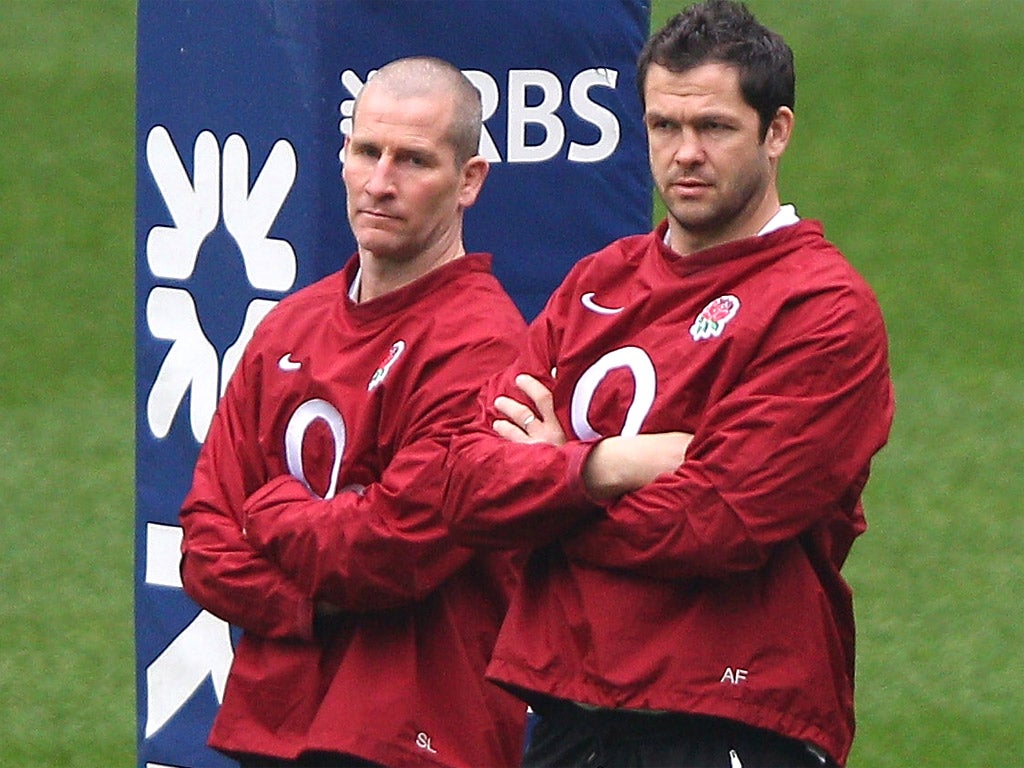Andy Farrell reveals 'difficult dilemma' of choosing England over Saracens
Highly rated coach found it hard to quit club rugby but is now focused on World Cup

Andy Farrell's unique qualities as a motivator will be among the key building blocks for England's bid to reclaim the World Cup on home soil in 2015 – his value as a coach in three years' time is likely to be immeasurably greater than the impact he made as a player in the 2007 tournament – but it could so easily have been a different tale. Only now can the true story of Farrell's return to the red-rose fold be told: a story of the great rugby league player's struggle with his conscience.
Farrell is not a great one for the sporting cliché, so when he used the phrase "emotional roller coaster" to describe the events of late spring and early summer, he could be forgiven. "The dilemma I faced was very difficult," he said this week, recalling the choice he faced between committing himself to England on a full-time basis after a successful Six Nations stint as interim coach and sticking with Saracens, the club who had devoted a good deal of time and money to establishing him as a serious force in the union code. "On the one hand. I had a fantastic job at a fantastic club who had looked after me so well. On the other, there was an opportunity to keep working with the cream of the country, coaching them to play the best in the world."
Initially, Farrell decided to stick with what he knew: he rejected England in favour of the then Premiership champions, partly because he felt the daily engagement of club coaching was still of crucial importance to his career and partly because "I didn't want to let down my mates – something that was, and is, very important to me". Then, a few weeks later, he turned turtle – a sudden, wholly unexpected development that caught everyone, including England's leading players, by surprise.
"When the Six Nations ended, I returned to a club who were in the thick of their season – right in the cut-throat part of it," said Farrell, speaking at the launch of the Rugby Football Union's performance academy, set up to accelerate the development of top-end players from the national age-group and second-string Saxons squad and largely financed by the car manufacturers BMW. "But when the season was over and the internationals were heading off for the tour of South Africa… that set me thinking about what a great time we'd had together during the Six Nations. Everyone at Saracens had gone their separate ways and I had time to reflect, to balance one choice against the other. It became clearer then."
The 37-year-old Lancastrian still holds Saracens dear – "They were unbelievably supportive when I made my decision; Nigel Wray [the chairman] was immense", he said – but the England job is now all-consuming. He flew to South Africa, a country he had never visited, for the opening Test of the June series in Durban, where his son Owen played fly-half, and watched the subsequent games in Johannesburg and Port Elizabeth from a hotel room in Australia, where he had undertaken a fact-finding mission, visiting union, league and Aussie Rules clubs in search of new ideas.
"It took some effort to watch those games from there: the kick-off time was two in the morning," he said. "I felt very involved; in fact, I wanted to be on the walkie-talkie. What did I see from England? I saw courage and fight and intensity. Those matches were tests of character. I've been all over the world with rugby, but I couldn't believe the extent to which union is a religion in South Africa. There were some young kids playing for us out there and the matches clearly defined where we need to go next as a team. Impressive as it was, the courage and the fight has to be a given. Now, it's about finding those extra one per cents that will help us beat the best."
Is this expanded backroom team, fleshed out by Farrell's return and the arrival of Mike Catt as attacking skills coach, capable of delivering those extras? Might not Catt prove one coach too many? "Problems only arise if the coaching group isn't tight," he replied. "When I was at Saracens, I was working with five coaches. If you're friends and you get along together and you pull in the same direction, it works well. I met up with Mike on Monday and we spent four hours chewing the fat about rugby.
"With this England job, I have time to think – time to take a breath if that's what I need. If I want to go up to Manchester and see Sir Alex Ferguson and talk about the nitty-gritty of what he does with United, I can. This is a big opportunity for me and while the international programme coming up is pretty taxing, it's a wonderful prospect."
Subscribe to Independent Premium to bookmark this article
Want to bookmark your favourite articles and stories to read or reference later? Start your Independent Premium subscription today.

Join our commenting forum
Join thought-provoking conversations, follow other Independent readers and see their replies